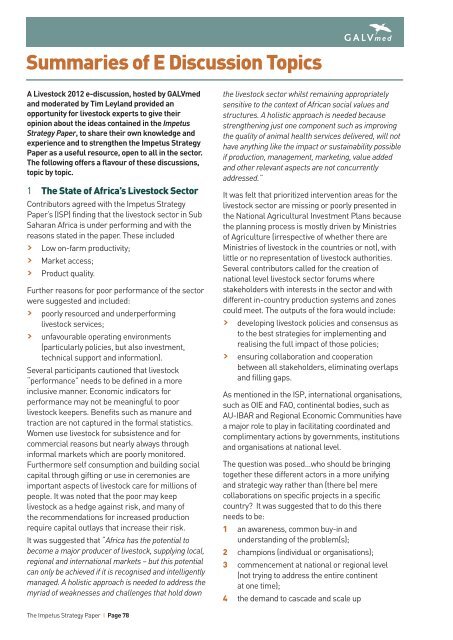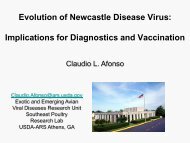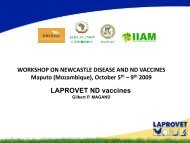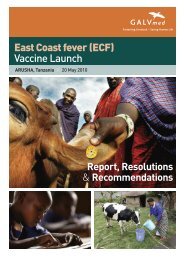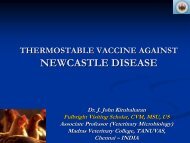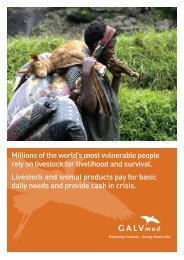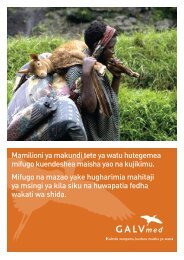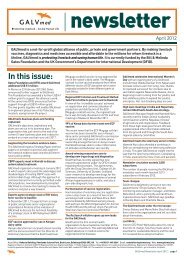A Path to Prosperity New Directions for African Livestock
GALVmed Impetus Strategy Paper
GALVmed Impetus Strategy Paper
- No tags were found...
Create successful ePaper yourself
Turn your PDF publications into a flip-book with our unique Google optimized e-Paper software.
Summaries of E Discussion Topics<br />
A Lives<strong>to</strong>ck 2012 e-discussion, hosted by GALVmed<br />
and moderated by Tim Leyland provided an<br />
opportunity <strong>for</strong> lives<strong>to</strong>ck experts <strong>to</strong> give their<br />
opinion about the ideas contained in the Impetus<br />
Strategy Paper, <strong>to</strong> share their own knowledge and<br />
experience and <strong>to</strong> strengthen the Impetus Strategy<br />
Paper as a useful resource, open <strong>to</strong> all in the sec<strong>to</strong>r.<br />
The following offers a flavour of these discussions,<br />
<strong>to</strong>pic by <strong>to</strong>pic.<br />
1 The State of Africa’s Lives<strong>to</strong>ck Sec<strong>to</strong>r<br />
Contribu<strong>to</strong>rs agreed with the Impetus Strategy<br />
Paper’s (ISP) finding that the lives<strong>to</strong>ck sec<strong>to</strong>r in Sub<br />
Saharan Africa is under per<strong>for</strong>ming and with the<br />
reasons stated in the paper. These included<br />
> Low on-farm productivity;<br />
> Market access;<br />
> Product quality.<br />
Further reasons <strong>for</strong> poor per<strong>for</strong>mance of the sec<strong>to</strong>r<br />
were suggested and included:<br />
> poorly resourced and underper<strong>for</strong>ming<br />
lives<strong>to</strong>ck services;<br />
> unfavourable operating environments<br />
(particularly policies, but also investment,<br />
technical support and in<strong>for</strong>mation).<br />
Several participants cautioned that lives<strong>to</strong>ck<br />
“per<strong>for</strong>mance” needs <strong>to</strong> be defined in a more<br />
inclusive manner. Economic indica<strong>to</strong>rs <strong>for</strong><br />
per<strong>for</strong>mance may not be meaningful <strong>to</strong> poor<br />
lives<strong>to</strong>ck keepers. Benefits such as manure and<br />
traction are not captured in the <strong>for</strong>mal statistics.<br />
Women use lives<strong>to</strong>ck <strong>for</strong> subsistence and <strong>for</strong><br />
commercial reasons but nearly always through<br />
in<strong>for</strong>mal markets which are poorly moni<strong>to</strong>red.<br />
Furthermore self consumption and building social<br />
capital through gifting or use in ceremonies are<br />
important aspects of lives<strong>to</strong>ck care <strong>for</strong> millions of<br />
people. It was noted that the poor may keep<br />
lives<strong>to</strong>ck as a hedge against risk, and many of<br />
the recommendations <strong>for</strong> increased production<br />
require capital outlays that increase their risk.<br />
It was suggested that “Africa has the potential <strong>to</strong><br />
become a major producer of lives<strong>to</strong>ck, supplying local,<br />
regional and international markets – but this potential<br />
can only be achieved if it is recognised and intelligently<br />
managed. A holistic approach is needed <strong>to</strong> address the<br />
myriad of weaknesses and challenges that hold down<br />
the lives<strong>to</strong>ck sec<strong>to</strong>r whilst remaining appropriately<br />
sensitive <strong>to</strong> the context of <strong>African</strong> social values and<br />
structures. A holistic approach is needed because<br />
strengthening just one component such as improving<br />
the quality of animal health services delivered, will not<br />
have anything like the impact or sustainability possible<br />
if production, management, marketing, value added<br />
and other relevant aspects are not concurrently<br />
addressed.”<br />
It was felt that prioritized intervention areas <strong>for</strong> the<br />
lives<strong>to</strong>ck sec<strong>to</strong>r are missing or poorly presented in<br />
the National Agricultural Investment Plans because<br />
the planning process is mostly driven by Ministries<br />
of Agriculture (irrespective of whether there are<br />
Ministries of lives<strong>to</strong>ck in the countries or not), with<br />
little or no representation of lives<strong>to</strong>ck authorities.<br />
Several contribu<strong>to</strong>rs called <strong>for</strong> the creation of<br />
national level lives<strong>to</strong>ck sec<strong>to</strong>r <strong>for</strong>ums where<br />
stakeholders with interests in the sec<strong>to</strong>r and with<br />
different in-country production systems and zones<br />
could meet. The outputs of the <strong>for</strong>a would include:<br />
> developing lives<strong>to</strong>ck policies and consensus as<br />
<strong>to</strong> the best strategies <strong>for</strong> implementing and<br />
realising the full impact of those policies;<br />
> ensuring collaboration and cooperation<br />
between all stakeholders, eliminating overlaps<br />
and filling gaps.<br />
As mentioned in the ISP, international organisations,<br />
such as OIE and FAO, continental bodies, such as<br />
AU-IBAR and Regional Economic Communities have<br />
a major role <strong>to</strong> play in facilitating coordinated and<br />
complimentary actions by governments, institutions<br />
and organisations at national level.<br />
The question was posed...who should be bringing<br />
<strong>to</strong>gether these different ac<strong>to</strong>rs in a more unifying<br />
and strategic way rather than (there be) mere<br />
collaborations on specific projects in a specific<br />
country? It was suggested that <strong>to</strong> do this there<br />
needs <strong>to</strong> be:<br />
1 an awareness, common buy-in and<br />
understanding of the problem(s);<br />
2 champions (individual or organisations);<br />
3 commencement at national or regional level<br />
(not trying <strong>to</strong> address the entire continent<br />
at one time);<br />
4 the demand <strong>to</strong> cascade and scale up<br />
The Impetus Strategy Paper I Page 78


